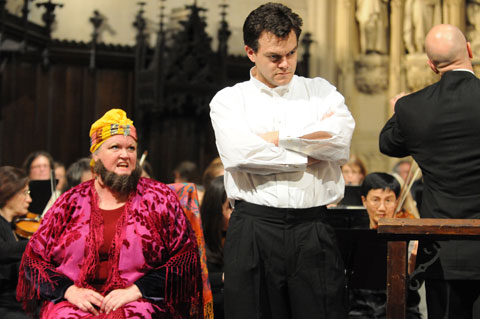
MAKING PROGRESS Mary Westbrook Geha, as Baba the Turk, has a few choice words for Charles Blandy’s Tom in Emmanuel Music’s glittering Rake. |
Three recent musical high points in Boston actually went on as originally announced: no changes, no cancellations, and nothing to do with James Levine, who had his own triumphs out of town, leading Berg's Wozzeck at the Met and a concert with the Met Orchestra at Carnegie Hall. (Was the BSO too hasty in accepting his resignation?)The Celebrity Series of Boston gave us Yuri Temirkanov and the St. Petersburg Philharmonic in their first Boston visit since 1998. They played a gorgeous, large-scale Rimsky-Korsakov Russian Easter Overture, Shostakovich's gnarly First Cello Concerto, with a stunning performance — both sweetly lyrical and violently muscular — by Boston's Alisa Weilerstein (more impressive than in Brahms's subtler Double Concerto with the BSO), and a noble, heartfelt, riveting, and very Russian (the tragic sighs of those opening strings!) Brahms Symphony No. 4. Their single encore was an unsentimental, well-paced, moving version of Elgar's nostalgic "Nimrod" from his Enigma Variations. Temirkanov is an elegantly restrained, almost minimalist conductor and the orchestra, one Europe's greatest (perhaps still better known as the Leningrad Philharmonic), has a burnished warmth that seems always to convey total conviction.
Then the Celebrity Series brought back the beloved and indispensable Slovenian pianist Dubravka Tomsic. A week earlier, the celebrated 22-year-old blind Japanese pianist Nobuyuki Tsujii, who won the 2009 Van Cliburn competition ("Nobu fever," ran a Time headline), had begun his first Boston recital with Beethoven's Tempest Sonata. It was uncanny, a technical marvel, though it was often too loud, hammered, and lacking in tonal nuance. (His Pictures at an Exhibition, on the other hand, had everything one could want.) So it was a particular pleasure to hear Tomsic's Tempest — kaleidoscopically colored, emotionally urgent, structurally compelling (those pregnant pauses and suspensions) — along with an equally glowing account of Beethoven's Les adieux. Then all four Chopin ballades. Tomsic, just turned 70 and recently widowed, gave the Chopin not just musical but narrative shape. Even on a less-than-perfect piano and with a fresh finger cut, the warmth and color of her playing gripped not only one's ears but also one's heart and mind. She always kept the glorious melodies forward. Everything breathed! She left the stage after four encores: three fleet, dazzling Liszt pieces and a truly dancing Chopin "Minute" waltz. Musical life in Boston always seems more alive for her presence.
And Emmanuel Music presented its first operatic venture under its new music director, Ryan Turner, a glittering and affecting concert version of Stravinsky's only full-length opera, The Rake's Progress. I haven't heard a live performance of Stravinsky's neo-classical masterpiece since David Hoose's memorable 2003 concert with the Cantata Singers. (Here, Hoose gave the illuminating pre-concert talk.) Once attacked as an ultra-conservative throwback to Mozart and Baroque opera, it's now acknowledged to be one of Stravinsky's most adventurous, capacious, and humane works. Rake has a notable history in Boston. In 1954, three months after Stravinsky had led its American premiere at the Met, he led it at BU, where it was staged by Sarah Caldwell, who did it again with her own Opera Company of Boston in 1967, with bikers and a discotheque. In 1991, Craig Wich put on an inspired low-budget version at MIT, with Paul Kirby as a heartbreaking rake. In 1995, Seiji Ozawa led it with Dawn Upshaw and the BSO.